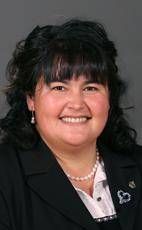Mr. Speaker, Quebec and Canada have been enriched by the men and women of all origins who take different paths to get here, bringing with them their traditions, customs and cultural baggage.
Between 1891 and 1914, Canada recruited agricultural immigrants from eastern Europe, inviting them to settle here and work the land in the Prairie provinces. Approximately 170,000 people immigrated to Canada before the first world war. We salute their contribution to the vitality of Quebec and Canada.
Unfortunately, there are dark days in Canadian history, when the government of the day interned people of Ukrainian origin because they were suspected of espionage and other illegal activities.
Agricultural immigrants got a decidedly colder welcome, particularly after the war broke out. In addition to being interned, Ukrainian immigrants lost their right to vote and the government confiscated their personal property.
In other words, we gave them land, the right to work and a place to live and then, without warning, we took it all away. They worked without pay on the development of Banff national park, in the forestry industry in northern Ontario and in Quebec, in the steel industry and the mines.
Today, the percentage of individuals arriving from different regions of the world continues to increase. This is excellent news, particularly since the latest waves of immigrants are highly educated graduates, who are emigrating in significantly higher numbers.
We are all expected to give them a warm welcome and to help them successfully integrate. We must ensure that they get their fair share of jobs and that they become full citizens as soon as possible.
This bill to render justice to Ukrainians and other Europeans from the former Austro-Hungarian empire who were incarcerated in internment camps during the first world war recognizes that Canada made serious mistakes and that immigration ministers implemented excessive measures.
We must remember what happened. Our collective memory will help us to ensure that we do not make these mistakes again.
During this session, I have spoken many times about citizenship and immigration. Immigration is not just about accountability, it is also about the men and women who want to help build Quebec and Canada. They expect to be treated in a just and equitable manner.
Before claiming victory, and knowing the many problems and inconsistencies in the current immigration policies, allow me again to emphasize to my colleagues in this House and invite them to reflect on the lot and the future of the people they receive. How would they like to be treated if they were in the same situation?
Early in my mandate, I met a great lady whose father is Chinese and mother is Ukrainian. Her father paid the infamous head tax required from Chinese persons and her mother had been unfairly targeted for many years because of immigration decisions that were made at the turn of the century.
She tried to hide her identity for a long time and I think that is very sad. There are many things people still do not know about Canada's history. I hope the steps Parliament is taking in various matters of this nature will comfort the communities concerned.
Bill C-331 has the support of the Ukrainian Canadian Congress and the Ukrainian Canadian Civil Liberties Association. I want to commend and thank those who have supported this cause and worked so hard on it for the past 20 years.
We have heard that Canada respected its international commitments on the treatment of prisoners of war throughout this entire painful experience. We do not share the opinion that this is what they were. We have some serious reservations about why the camps continued to exist until 1920, when the war had ended a long time before. Taking refuge behind treaties and conventions does not, however, excuse the fact that these people were subjected to disgraceful treatment.
Other incidents have been the subject of demands for reparation, and some have been settled. Others are still in progress. To give some examples: the forced assimilation and abuse of aboriginal children in boarding schools from 1847 to 1985; the head tax and the exclusionary legislation on the Chinese from 1885 to 1946; the imprisonment of lepers on two islands off the coast of British Columbia from 1891 to 1956; the unfair treatment of Caribbean blacks from 1900 to 1932; the closing of Canada's borders to persons of Jewish origin between 1938 and 1948; the internment of Italian and German Canadians during the second world war; the internment of Japanese Canadians during and after the second world war, from 1942 to 1949; and, after 1949, the refusal to pay benefits to aboriginal war veterans.
The path to freedom for a people is never easy. For this reason, I will take advantage of this moment to affirm the support of the Bloc Québécois for all those who are defending their liberty and equality at this time.
Anyone wishing to learn more about this subject can consult the Internet site www.infoukes.com, where there are a number of photos and explanatory texts.
Immigration is an increasingly important phenomenon in our society. We must be equal to the ideals we defend. We must be capable of acknowledging errors so that history will not repeat itself.

